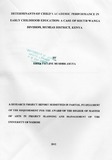| dc.description.abstract | Over the past decade in African traditional society, a child received maximum care and education not only from their parents but also from the society. This research study sought to identify the determinants of child's academic performance in Early Childhood Education. Despite the government willingness and commitment to improve access and quality education in Early Childhood Centers and all levels, poverty level consumption for resources from other social sectors has been a major hindrance to full commitment. Kenya being strategically located in East Africa and having great potential of development, many schools and Early Childhood Centers are involved in making sure children have a good foundation for their late lives.
The collected data was both historical and futuristic this is because the study established the number of centers, trained and untrained teachers. A questionnaire was structured to be sent to various Head teachers and Early Childhood Education teachers to identify key areas and challenges they experienced in Early Childhood centers and how they managed to overcome the challenges. Interview guide was used on getting response from the 39 sponsors. The data collected was analyzed using statistical tools such as correlation analysis and the mode to determine child's performance in Early Child Hood centers.
The selection was by use of simple random sampling method in those Early Childhood centers in operation basing on public, private and church sponsorship. The study approach was descriptive survey method for the registered Early Childhood centers that were chosen. The study aimed at attaining objectives on how teaching and learning facilities, professional qualification of teachers, family factors and teacher motivation influence child's academic performance in early childhood education. The study population was 39 sponsors, 78 early childhood teachers and 64 head teachers. Data analysis was analyzed using tables, frequencies and percentages.
The validity of the instruments was considered in this study by presenting the developed instruments to the supervisor and research experts to evaluate their application and appropriateness of the content clarity and adequacy of the contraction instruments from research prospective. The findings were majority of primary headteachers and ECDE teachers were of certificate levels. Primary head teachers had not taken early childhood teachers as part of their school because of the little support from parents and guardians which could not maintain early childhood centre activities.
The instruments were administered to the same individuals to see if they are reliable. Data analysis of the data collected was by use of qualitative techniques. There should be adequate teaching and learning facilities funded by donors, well wishers. Constituency Development Fund and Kenya School Support Programme. Families should start income generating activities to improve on their income to be able to pay fees for their children at Early Childhood Centres. The findings of the research will be useful to Ministry of Education, training colleges and Kenya Institute of Education in curriculum development. | en_US |

